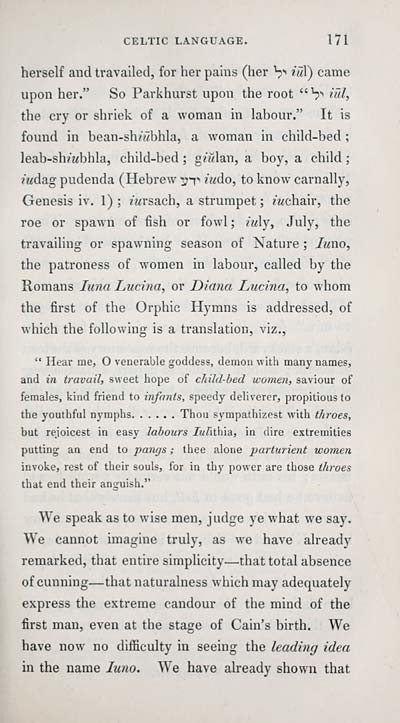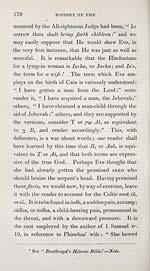Download files
Complete book:
Individual page:
Thumbnail gallery: Grid view | List view

CELTIC LANGUAGE. 171
herself and travailed, for her pains (her b'' ^ùV) came
upon her." So Parkhurst upon the root "b"^ iùl,
the cry or shriek of a woman in lahour." It is
found in bean-sh/«bhla, a woman in child-bed ;
leab-sh/Mbhla, child-bed ; gmlan, a boy, a child ;
?Mdag pudenda (Hebrew 3?^ iudo, to know carnally,
Genesis iv. 1); mrsach, astrumpet; mchair, the
roe or spawn of fish or fowl ; iuìy, July, the
travailing or spawning season of Nature ; luno,
the patroness of women in labour, called by the
Romans luna Lucina, or Diana Lucina, to whom
the first of the Orphic Hymns is addressed, of
which the foUowing is a translation, viz.,
" Hear me, O venerable goddess, demoii with many names,
and in travail, svveet hope of child-bed loomen, saviour of
females, kind friend to infnnts, speedy deliverer, propitiousto
the youthful nymphs Thou sympathizest with throes,
but rejoicest in easy labours J«Zithia, in dire extremities
putting an end to pangs ; thee alone parturient women
invoke, rest of their souls, for in thy power are those throes
that end their anguish."
We speak as to wise men, judge ye what we say.
We cannot imagine truly, as we have already
remarked, that entire simphcity — that total absence
of cunning — that naturalness which may adequately
express the extrerae candour of the mind of the
first man, even at the stage of Cain's birth. We
have now no difficulty in seeing the leading idea
in the name luno. We have already shown that
herself and travailed, for her pains (her b'' ^ùV) came
upon her." So Parkhurst upon the root "b"^ iùl,
the cry or shriek of a woman in lahour." It is
found in bean-sh/«bhla, a woman in child-bed ;
leab-sh/Mbhla, child-bed ; gmlan, a boy, a child ;
?Mdag pudenda (Hebrew 3?^ iudo, to know carnally,
Genesis iv. 1); mrsach, astrumpet; mchair, the
roe or spawn of fish or fowl ; iuìy, July, the
travailing or spawning season of Nature ; luno,
the patroness of women in labour, called by the
Romans luna Lucina, or Diana Lucina, to whom
the first of the Orphic Hymns is addressed, of
which the foUowing is a translation, viz.,
" Hear me, O venerable goddess, demoii with many names,
and in travail, svveet hope of child-bed loomen, saviour of
females, kind friend to infnnts, speedy deliverer, propitiousto
the youthful nymphs Thou sympathizest with throes,
but rejoicest in easy labours J«Zithia, in dire extremities
putting an end to pangs ; thee alone parturient women
invoke, rest of their souls, for in thy power are those throes
that end their anguish."
We speak as to wise men, judge ye what we say.
We cannot imagine truly, as we have already
remarked, that entire simphcity — that total absence
of cunning — that naturalness which may adequately
express the extrerae candour of the mind of the
first man, even at the stage of Cain's birth. We
have now no difficulty in seeing the leading idea
in the name luno. We have already shown that
Set display mode to: Large image | Transcription
Images and transcriptions on this page, including medium image downloads, may be used under the Creative Commons Attribution 4.0 International Licence unless otherwise stated. ![]()
| Early Gaelic Book Collections > Hew Morrison Collection > Adhamh agus Eubh, no Craobh Sheanachais nan Gàël > (301) |
|---|
| Permanent URL | https://digital.nls.uk/76900353 |
|---|
| Description | A selection of items from a collection of 320 volumes and 30 pamphlets of literary and religious works in Scottish Gaelic. From the personal library of Hew Morrison, the first City Librarian of Edinburgh. |
|---|
| Description | Selected items from five 'Special and Named Printed Collections'. Includes books in Gaelic and other Celtic languages, works about the Gaels, their languages, literature, culture and history. |
|---|

